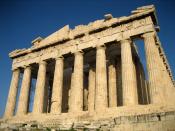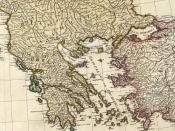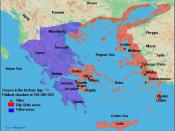The Golden Age is considered the pinnacle of Greece as a nation and a society. It was the highest point of wealth and prosperity in GreeceÃÂs history and therefore the happiest of times. This period was also the peak of Grecian art, writings, sculpture, theatre, and architecture. The Golden Age is credited with forming the modern day stereotype of what Grecian life was like. The Greeks greatly influenced modern day culture through the establishment of a standard of living for society. The Greeks further established a model government that, despite many wars, functioned fairly well without dispute from the people.
The Golden Age of Greece began around 500 BC and lasted until approximately 300 BC. Directly prior to the beginning of this age, Greece had just finished fighting a war against Persia. Although the Greeks won this war, they were the victors only by a small margin. This small margin revealed to many of the empowered Grecian people that Greece needed to be a united nation, not an assembly of independent city states.
Greece then began the complicated process of unifying itself into a single nation. Athens set up the Delian League to aid in this process.
The two most well known city states of this time were Athens and Sparta. (ahistoryofgreece.com) These two cities were responsible for bringing Greece to its pinnacle as a society. Athens in general was the stereotypically more refined and sophisticated city state of the two. The Athenian society put great emphasis on the humanities and the arts. Sparta, on the other hand, favored the individual for his athletic ability and for his greatness as a warrior. Sparta, as a whole, was a very warlike and militaristic society. The Spartans formed the backbone of the Grecian Army and were the go-to guys when war broke...


